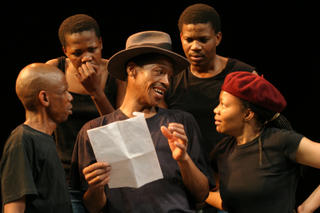
Amajuba - Like Doves We Rise opened on Tuesday night and, well, I'm not sure of my reaction. Speaking to another attendee today, I had an interesting conversation which included something along the lines of "I feel terrible saying this, but...".
I don't feel so bad saying it, but it hammered the point home: this is a show which conveys the true stories of five young performers from South Africa, and often includes personal experiences of such a horrible atrocity that I can't imagine going through the same things and surviving intact. But does that make it good theatre? Of course not. The power of these stories is undeniable, as is the awe-inspiring level of vocal ability displayed in both charismatic, attention-grabbing monologue and harmonic singing. But in some senses Amajuba is the perfect contrast to Le Dernier Caravanserail: much shorter, logically structured (chronological and split into five sections, each a separate story from a different performer), and most importantly, employing minimal theatrics or devices. It's an attempt at honesty, at letting the story speak for itself, and the presence and talent of each actor isn't obfuscated by distancing effects or unnecessary spectacle.
The upshot? I found it hard to engage with a lot of the show. I found it interesting, important, challenging and at times disturbing. But these are all overused terms that have largely been emptied of meaning by the fact that reviewers frequently fall back on them when unable to dredge up more original ways of interpreting an experience. Amajuba might be all these things, but it didn't knock my socks off in the way some of the other Festival shows have. And though I might "feel bad saying this", I don't know that I should (or even if I really do).
The other niggling issue I had was when I read that the show has never been that appreciated back home, despite the acclaim it accords all over the rest of the globe. I wondered if this was because, as is noted at the beginning of the show, the stories presented aren't exceptions in South Africa - they're typical. If so, it makes me fear for the possibility that what the piece offers some audiences is nothing deeper than novelty value, exoticism that doesn't actually allow an engagement with the issues at stake. Certainly, I didn't get a complex sense of the history or politics of the country beyond what I already knew. I might be making the error of attempting to read other's reception of the show, though. Don't want to do that.
Finally, I was troubled that so many reviewers describe the show as "uplifting" above all else. It wasn't uplifting to me. It was grim, horrific and sometimes deeply depressing. The music was soaring and hugely emotive, but it seemed as often to be attempting to express great despair, rather than acting as a way out of it. The performers, like the title's doves, do rise above their situations, but describe it as always staying a part of who they are, not something to be left behind. I don't know what I left behind upon exiting the theatre. Still trying to work it out.
No comments:
Post a Comment